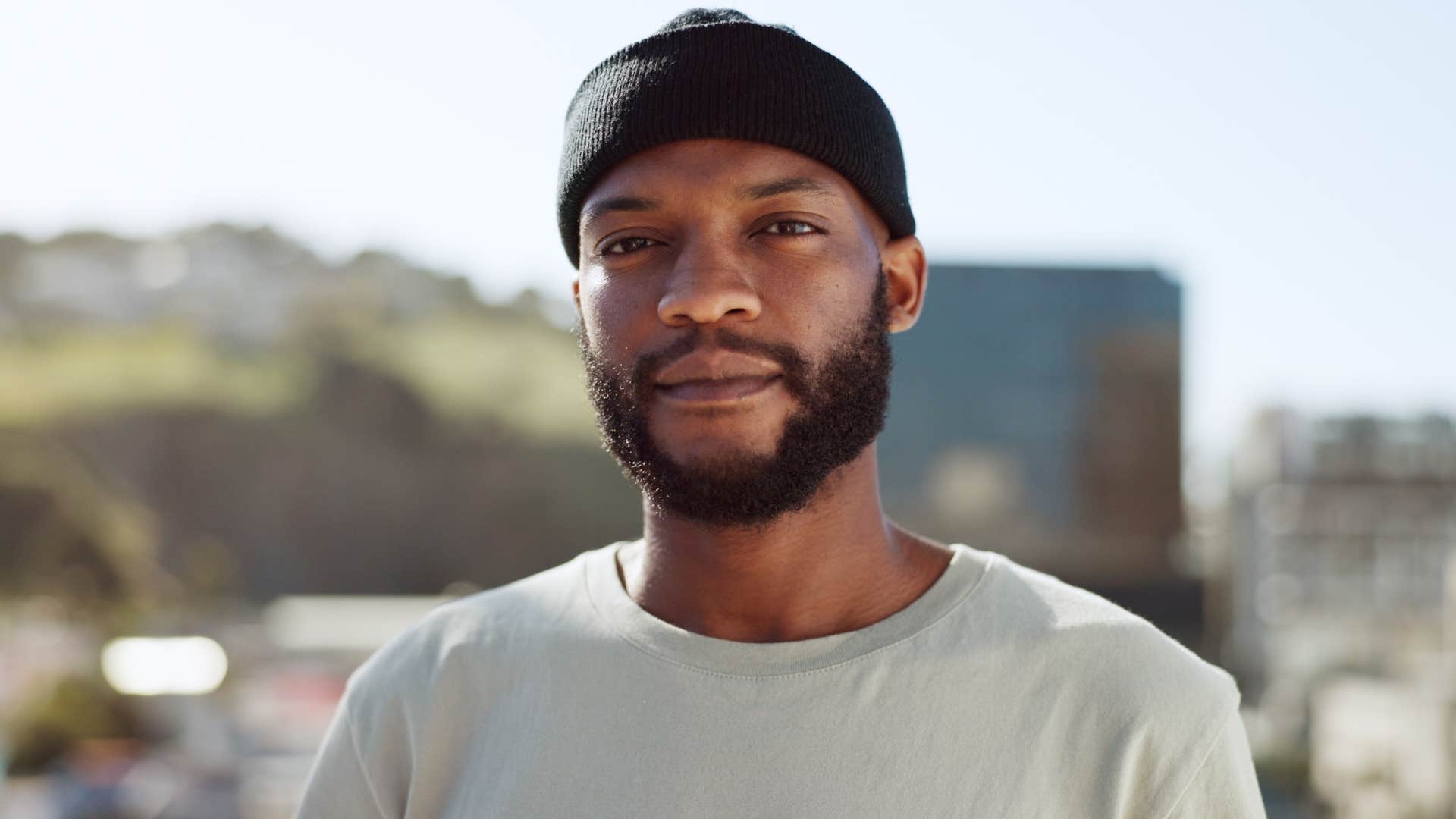People Who Distance Themselves From Family Once They Grow Up Usually Have These 12 Reasons
Maintaining a healthy family dynamic isn't easy, especially into adulthood.
 primipil via Canva
primipil via Canva Parental estrangement and disconnect has been a struggle across generations of adult children and their families for decades. In fact, one 1987 study found that nearly 7% of adult children were estranged from their mothers, with over 27% experiencing alienation from their fathers. In recent years, this trend has only continued to grow, with more technological accessibility and support resources linking adult struggles to childhood experiences.
While social media and technology has definitely influenced people who distance themselves from family once they grow up, they aren't typically solely motivated by online discourse, but rather by a sleuth of other emotional, social, and psychological reasons they've struggled to heal from. From parental relationships, to boundaries, and mental health concerns, sometimes distance is what families need to truly heal.
Here are 12 reasons people distance themselves from family once they grow up
1. They don't feel emotionally supported
 Kateryna Onyshchuk | Shutterstock.com
Kateryna Onyshchuk | Shutterstock.com
Not feeling heard or genuinely supported growing up can spark resentment between children and their families early in life that often culminates in disconnect and distance in adulthood.
When adult children have the autonomy and stability to start their own lives, the resentment they feel — sometimes subconsciously — towards their families can urge them to skip holidays, visit less, and move away.
Especially if they're already dealing with mental health concerns like depression or a busy schedule, like psychotherapist Amy Morin, LCSW suggests, having unsupportive family members who don't make you feel heard or valued can take an extra toll on an adult child's emotional well-being, leaving them feeling more isolated, even when they're in the presence of their family.
While it can be uncomfortable for family members who are used to seeing their kids often, this distance generally sets appropriate boundaries for people in desperate need of healing.
They have space to invest in relationships that do support them, but also alone time and separation to cultivate an identity that's not yearning for constant validation or love.
2. Their family talks negatively about them behind closed doors
 Nata Navo | Shutterstock.com
Nata Navo | Shutterstock.com
Family dynamics fueled by drama and a constant spread of rumors tend to spark anxiety and stress amongst family members, especially those being targeted.
When adult children don't feel heard, alongside negative and unnecessary critics of their identities and character, it only makes sense to set boundaries — whether that be communication expectations or distance.
Especially for adult children with divorced parents, like Ken Lewis suggests in a report on parental alienation, this kind of drama can be characterized as emotional abuse — forcing kids to "pick a side" or listen to harmful conversations about their fellow family members.
By opting for a more disconnected relationship, adult children not only protect their emotional well-being, but separate themselves from the anxieties of parental alienation and drama.
3. They don't feel like they belong
 Chay_Tee | Shutterstock.com
Chay_Tee | Shutterstock.com
According to a study from Educational Psychologist, feeling a sense of belonging with your family is about more than community and inclusion, it can help people to feel understood, loved, valued, and paid attention to.
When adults feel excluded from this unconditional love and support, it can isolate them in problematic ways that become emotionally taxing alongside the typical strains of daily life.
Why would you continue investing in relationships with people who don't care to make you feel supported? What's the point in continuing to show up to family holidays where you feel like an outsider?
While it may be confusing and disillusioning to come to a realization that you need better boundaries with your family, taking space to figure out what's best for you can be empowering.
4. Their family doesn't accept their identity or lifestyle
 Fizkes | Shutterstock.com
Fizkes | Shutterstock.com
Family acceptance is incredibly important, not just for children early in life, like a study from the Pediatric Clinics of North America argues, but for adults who are still learning about themselves, how to navigate their lives, and what relationships are worthy of their time.
When our family accepts us and celebrates our authentic identities, we feel more comfortable to express ourselves in other areas of life.
However, when our families — the ones who usually know us best and are closest to us — choose to invalidate our identities and criticize our choices, that only sparks a sense of anxiety and insecurity.
Creating distance between a toxic family who ridicules your authenticity can be an incredibly healthy boundary for adults to set to protect their well-being.
5. They're burnt out or stressed
 Ground Picture | Shutterstock.com
Ground Picture | Shutterstock.com
Experts from MedPark Hospital argue that burnout can look uniquely different depending on the person and situation, but is generally founded on feeling overworked, overwhelmed, and stressed without avenues for emotional regulation or rest.
People struggling with burnout not only struggle with their professional and personal relationships, they tend to isolate themselves at the expense of their emotional health.
Some adult children navigating their careers, new families, and financial strain may inadvertently create distance with their families to cope with their burnout symptoms.
Even if they have a healthy relationship with their family, experiencing burnout symptoms can urge them to self-isolate.
6. They're struggling with guilt or shame
 Pixel-Shot | Shutterstock.com
Pixel-Shot | Shutterstock.com
Uncomfortable emotions like guilt, shame, and embarrassment can be incredibly difficult to heal from, especially for people who don't have stable emotional regulation skills or healthy relationships to communicate through them with.
For adult children whose shame and guilt is intrinsically tied to their childhood or family relationships, making space and time for holiday gatherings and social family events can be hard.
Not only does it open up the door to revisit these often-suppressed emotions, it can urge them to slip into a toxic, less comfortable emotional state that sabotages their growth, relationships, and well-being.
By setting clear boundaries around their family time, they can ensure they're looking out for their health and taking control over the triggering relationships and family dynamics that disturbs their peace.
7. Their family never reaches out
 Prostock-studio | Shutterstock.com
Prostock-studio | Shutterstock.com
Small gestures like sending your kids a song that reminds you of them or calling them to chat about life can have profound effects on the health of your relationship. I
t's these small acts of kindness and gratitude that fuel our health, making us feel more appreciated, valued, and loved by the people closest to us.
Many adults don't receive those positive feelings from communication with their families; instead they feel burdened by a sense of stress, anxiety, and obligation with family members that only reach out when they need something.
8. They don't feel like their boundaries are respected
 Fizkes | Shutterstock.com
Fizkes | Shutterstock.com
Adults deserve to have their boundaries respected, whether they're emotional, physical, or psychological, especially by the people in their families that are supposed to have their best interest in mind.
When family members overstep boundaries, even following conversations about expectations and respect, it's a clear sign that they don't value your wishes — which can spark resentful feelings that aren't healthy for anyone to endure.
9. They're still healing from unresolved trauma
 PeopleImages.com - Yuri A | Shutterstock.com
PeopleImages.com - Yuri A | Shutterstock.com
Dealing with unresolved childhood trauma and toxic familial relationships can put a difficult strain on adult children's current lives — from coping with stress, to investing in new relationships, to maintaining a level of emotional and physical stability necessary to navigate their daily lives.
According to experts from Emerald Isle Healthy and Recovery, these adults may experience a defensiveness in their daily lives as a result of their trauma, living in a toxically self-preserving manner that can isolate them from healthy connection and healing.
Of course, being around the people or in the environment where this unresolved trauma took place can be particularly triggering for adults — bringing them back to the identity they once held or forcing them to confront the uncomfortable emotions they were once plagued with.
With distance, they can protect themselves from that experience and make space to heal.
10. They have different values than their family
 Gorodenkoff | Shutterstock.com
Gorodenkoff | Shutterstock.com
Especially as adult children grow into their new identities and start their own families, it's not uncommon for them to develop new values, perspectives, and beliefs that don't necessarily align with their parents.
In households where open communication and basic empathy are overlooked, this misalignment can spark stress, anxiety, and tension.
Without clear boundaries to help regulate interactions, many adult children feel an inherent sense of disconnect from their families, especially when they're immediately judged or criticized for their views.
Distance is inevitable in these situations, often straining family relationships and holidays without avenues for stress relief or compromise.
11. They feel like the family 'scapegoat' at gatherings
 Antoniodiaz | Shutterstock.com
Antoniodiaz | Shutterstock.com
Like therapist Yolanda Renteria, LPC argues, the family "scapegoat" is typically a single family member that gets blamed for everything — from sparking conflicts, to creating disconnect, and even introducing stress into family gatherings.
Often misunderstood and alienated, family members labeled as the scapegoat are often burdened with a narcissist parent's toxic behavior.
Instead of going to gatherings where they're constantly blamed and never truly appreciated, these adult children instead set clear boundaries around the kind of respect they expect from their families.
12. They're focused on building their own family
 Rido | Shutterstock.com
Rido | Shutterstock.com
Disconnect is often natural in families, especially later in life when adult children are building their own lives and starting their own families.
Not all distance between adult children and their families is fueled by resentment or something inherently burdening — sometimes they're simply investing into their own personal lives, forced to sacrifice certain family holidays or traditions for the sake of their own.
Zayda Slabbekoorn is a staff writer with a bachelor's degree in social relations & policy and gender studies who focuses on psychology, relationships, self-help, and human interest stories.
